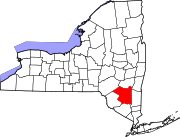Big Indian, New York
Big Indian, New York | |
|---|---|
| Country | United States |
| State | New York |
| Region | Catskills |
| County | Ulster |
| Town | Shandaken |
| Time zone | UTC-5 (Eastern (EST)) |
| • Summer (DST) | UTC-4 (EDT) |
Big Indian is a hamlet within the Town of Shandaken in Ulster County, New York, United States. It is located along State Route 28, within the Catskill Park 17 miles west of Woodstock. The Esopus Creek runs through the area, as Birch Creek feeds in from the north. Big Indian Hollow is located slightly to the west, while Big Indian Mountain sits to the southwest.
Origin of name
Once a Munsee Native American man named Winneesook (the name means "snowfall") lived near Marbletown, New York; because of his height of about seven feet, he was also called Big Indian. He was in love with a local woman, Gertrude Molyneux, who eventually loved him as well; because her parents opposed the match, they arranged a marriage with one Joseph Bundy. Disliking Bundy, Gertrude eloped with Winneesook into the wilderness. Some years later, a party of people searching for a missing cow was led by Bundy; still seeking revenge, he accused "that big Indian" of stealing the cow. When they finally found Winneesook, Bundy shot him with his rifle and injured him severely; after being left alone, Winneesook crawled to a pine tree where Gertrude found him later dying. After Winneesook's death and burial, Gertrude and her children moved to the site; the hamlet of Big Indian later developed at that location. Local lore holds that the pine tree stood until the railroad through Big Indian was built in the 1880s.[1]
Climate
This climatic region is typified by large seasonal temperature differences, with warm to hot (and often humid) summers and cold (sometimes severely cold) winters. According to the Köppen Climate Classification system, Big Indian has a humid continental climate, abbreviated "Dfb" on climate maps.[2]
Notable people
- Lhasa de Sela, singer
- Dean Gitter, entrepreneur
- Albert Rudolph, spiritual teacher
References
- ^ Evan T. Pritchard (2002). Native New Yorkers: the legacy of the Algonquin people of New York. Council Oak Books. pp. 241–242. ISBN 978-1-57178-107-9.
- ^ Climate Summary for Big Indian, New York
42°06′10″N 74°26′35″W / 42.10278°N 74.44306°W

